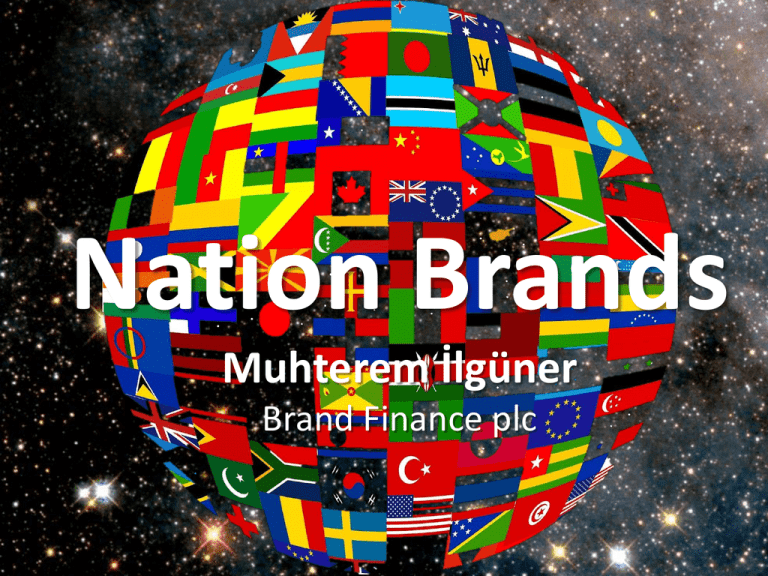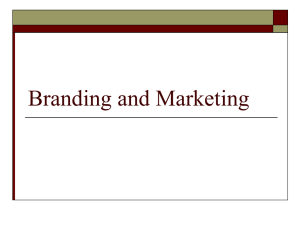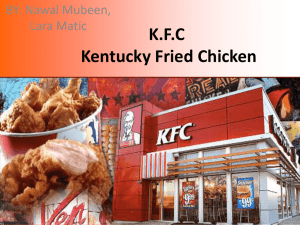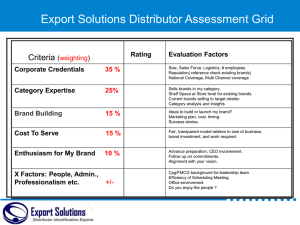Document
advertisement

Nation Brands Muhterem İlgüner Brand Finance plc Countries, like corporations, have brands; reputations that shape the decisions of foreign consumers and investors These brands can be positive (“German engineering”) or negative ….(?) Countries seeking to boost their exports, encourage foreign investment, or attract tourists and talent need to develop strong Nation Brands 2 Brand Finance Nation Brands IndexTM 3 Introduction to the Nation Brands valuation exercise Scope Data • High level valuation of nation brands using publicly available information • GDP used as a proxy for brand revenues • Currency: USD$ • Brand Value calculated using Royalty Relief method • Countries included in scope of exercise determined by availability of financial and market data as well as consumer research • Historic and forecast GDP sourced from IMD (World Competitiveness Yearbook) • GDP was segmented into the following categories: Primary (Agricultural/ Forestry/ Fishing etc) Secondary (Manufacturing/ Industry etc) Tertiary (Services/ Financial & Insurance etc) Brand Profiling • Brand strength determined using IMD (World Competitiveness Yearbook) and World Economic Forum Global Competitiveness Index • Brand strength analysis includes three macro categories consisting of: Infrastructure & Efficiency Brand Equity Economic Performance • Individual royalty rate ranges determined for each of the three categories • Discount rate calculated using WACC, data sourced from Bloomberg 4 The Nation Brand Impact FrameworkTM This framework identifies the 4 segments in which countries can build the economic value of their Nation Brand. Segment Investment Internal Domestic investment Inward investment Encourage local commerce to invest domestically as opposed to investing overseas Attract Foreign Direct Investment (FDI), including business relocation Domestic tourism Tourism Product Talent External Foreign tourism Encourage citizens to explore domestic destinations rather than vacationing abroad Promote the nation to foreign tourists and conference delegates Domestic brands Export brands Encourage citizens to buy locally made products and services i.e. reduce imports Promote nation’s products and services to international markets i.e. increase exports Domestic talent International talent Encourage citizens to study and work locally, rather than going overseas i.e. avoid “brain drain” Encourage foreign students and skilled workers to come to study and work in the country The Nation Brand Impact™ framework identifies the 4 segments that enable countries to identify, build and unlock the potential economic value within their nation brand. These 4 segments each have a crucial role to play in leveraging and improving a Nation Brand’s ability to enhance GDP growth. 5 Determining a nations brand strength To conduct the valuation, it is necessary to determine the strength of the nation brand against other nation brands under review. Brand Strength Index (100%) Infrast. & Effic. 33.3% Brand Equity 33.3% Econ. Perform. 33.3% Productivity 1.8% Image Abroad 8% GDP 2.4% Brain Drain 1.8% Quality of life 8% GDP Growth 2.4% Attracting talent 1.8% Customer Satisfaction 8% National Debt 2.4% Worker Motivation 1.8% National Culture 8% Resiliance of Economy 2.4% Adaptability of Companies 1.8% Exports of Goods 2.4% Ethical Practices 1.8% Exports of Services 2.4% Social responsibility 1.8% Trade to GDP Ratio 2.4% Health Concerns 1.8% Tourism Reciepts 2.4% Globalization 1.8% Imports of G&S 2.4% Flexability 1.8% Employment 2.4% Value System 1.8% Consumer Price Inflation 2.4% Corporate Values 1.8% Cost of Living 2.4% Internet Users 1.8% Investment Risk 2.4% Tech Funding 1.8% Fin risk factor 2.4% Pollution 1.8% Health Expenditure 1.8% Sustainable Development 1.8% Illiteracy 1.8% This chart summarises the conceptual approach of measuring brand strength within a single index. Our BSI incorporates a range of measures covering Infrastructure & Efficiency, Brand Equity (‘BE’) and Economic related to the nation brand relative to competitor nation brands. The chart demonstrates that brand equity is only one macro level component (derived from various micro level attributes) of brand strength. Brand strength therefore measures both quality and size: i. Quality - the equity the brand has with users of the brand; ii. Size - the physical presence of the brand in the global market. & Brand strength is considered a snapshot of the brand’s performance at a given point in time. BE is considered to be a leading indicator of the brand’s future performance. 6 Top 10 Nation Brands 2011 ($ billions) RANK 2011 NATION BRAND VALUE ($ bn) RATING 2011 1 USA 11,370 AA- 2 GERMANY 3,146 AA 3 CHINA 3,001 A+ 4 JAPAN 1,940 A 5 UNITED KINGDOM 1,849 AA- 6 FRANCE 1,673 A 7 ITALY 1,515 A- 8 CANADA 1,309 AA 9 INDIA 1,266 A+ 10 BRAZIL 959 A 73 LEBANON 31 A- Source: Brand Finance® Top 100 Nations Brand Index 7 Brand Lebanon Source: Brand Finance® Top 100 Nations Brand Index 2012 Brand Value ($ Billion) 2011 2012 37 31 Change in Brand Value -16% INVESTMENT A- A- TOURISM BB B TALENT A A+ PRODUCT A- A- Overall Brand Rating A- A- Rank on the League Table (Total= 100 countries) 65 73 Brand Strength Index Brand Lebanon: Brand Strength Index components INVESTMENT Investment Development Authority of Lebanon 52 Effectiveness of anti-monopoly policy 52 Trade tariffs 51 Business costs of terrorism Favouritism in decisions of government officials 50 Direct investment flows inward ($bn) 2009 2010 2011 2012 Venture Capital availability PRODUCT (GOODS & SERV) Reduced burden of customs procedures 54 Time required to start a business 53 Exports as a percentage of GDP World exports contribution (%) 52 52 Public trust of politicians Judicial Independence 2009 2010 2011 2012 Source: Brand Finance® Top 100 Nations Brand Index Brand Lebanon: Brand Strength Index components TALENT (PEOPLE & SKILLS) 56 Tertiary education enrolment rate 56 Internet access in schools Quality of management schools Reduced brain drain 54 54 Extent of staff training Female participation in labour force 2009 2010 2011 2012 TOURISM Visitor Satisfaction 49 49 41 39 Image abroad Tourism Receipts Cost of Living Quality of overall infrastructure 2009 2010 2011 2012 Source: Brand Finance® Top 100 Nations Brand Index Every brand is a promise to be demonstrated «let visitors experience this promise!» A soft factors world! 11 … a story about gaining added value by moving from: Low complexity Tangibles High Complexity Intangibles starts with visiting.. Domestic Companies Potential Residents Tourists Business Investors International Companies Visitors Business Visitors Residents Present Residents Nation Branding Agency Nation Branding Strategy Culture History, Famous people Important events, Etc. Nature Unique Produce Talent Location, Climate, Etce. Food, Natural source, Minerals, etc. Capability, Mastery, Etc. 14 Nation food branding is becoming more important 20 b. € revenue from geographical indication; wine, liquor, cheese, … 15 b. € revenue from geographical indication; olive oil, ham, cheese, ... 15 City branding is becoming more important More than half of the world population is living in cities «urbanisation» Cities are now; • attracting talent • attracting visitors • attracting investors İstanbul, 2012 9 m. visitors, 53 multi-national congresses with more than 500 delegates (No.1) 16 National and commercial brands work together Commercial brands help define the nation brand and visa versa Background 17 Other developing nation brands A huge opportunity ? ? ? ? Background 18 Segment Investment Internal Domestic investment Inward investment Encourage local commerce to invest domestically as opposed to investing overseas Attract Foreign Direct Investment (FDI), including business relocation Domestic tourism Tourism Encourage citizens to explore domestic destinations rather than vacationing abroad Domestic brands Product Talent External Foreign tourism Promote the nation to foreign tourists and conference delegates Export brands Encourage citizens to buy locally made products and services i.e. reduce imports Promote nation’s products and services to international markets i.e. increase exports Domestic talent International talent Encourage citizens to study and work locally, rather than going overseas i.e. avoid “brain drain” Encourage foreign students and skilled workers to come to study and work in the country 19 An accreditation system encompassing all processes from production to marketing, and from sales to after-sales services, of products/services having a competitive advantage and branding potential Turquality has four principal mission statements given the complex and tough structure of the hypercompetition which today reigns in international markets: _ to support the branding expenditures of the selected Turkish brands _ to provide coaching and consulting services to Turkey’s best companies in order to allow them to compete globally _ to act as a catalyst and incubator for the selected Turkish brands _ to provide PR and communications activities in order to create and promote a positive Turkish image. 20 An accreditation system encompassing all processes from production to marketing, and from sales to after-sales services, of products/services having a competitive advantage and branding potential. Including all expenditures/costs for this purpose %50 refund 85 companies, 101 brands A master’s degree education programme on marketing/branding 21 BRAND LEBANON • quantitatively evaluate current policies and develop a strategic approach • target limited resources to create the best results 22 STRATEGY Nation Brand Development Strategy Stage 1: Macro Analysis Nation as a whole at a high level. Centrered around initial engagement with key nation brand stakeholders and building a base of research knowledge. Stage 2: Micro Analysis Detailed analysis of sectors within the nation. Leads from initial research to developing sector level development strategies Stage 3: Implement & Monitor Development and implementation of nation and sector level plans for nation brand development in concert with stakeholders. Cover’s immediate tasks and implementation paths over 5, 10, 15, 20, 25 years STRATEGY Nation Brand Development Strategy Stage 1: Macro Analysis Step 1: Engage key stakeholders in government, business, finance, media Step 2: Research the nation as a ‘business’ and a ‘brand’ Step 3: Review legal rights, stakeholder research and national accounts data Step 4: Analyse key regional and global trends across the 4 segments of the Nation Brand Impact FrameworkTM Step 5: Set initial priorities for nation brand development «The brand of a country has a direct impact on the wealth of the nation and its ability to compete and grow in the global economy.» 25







